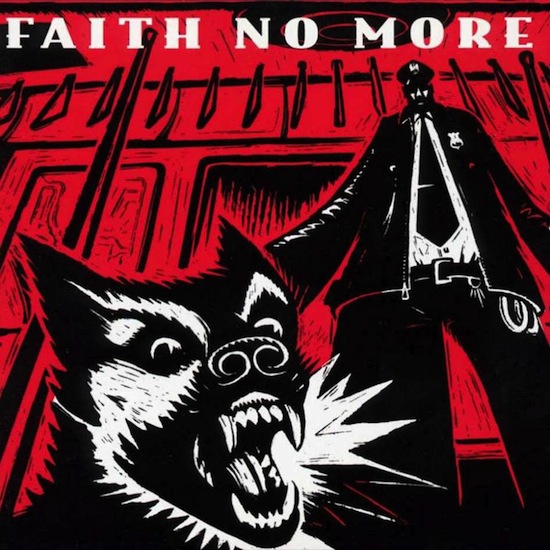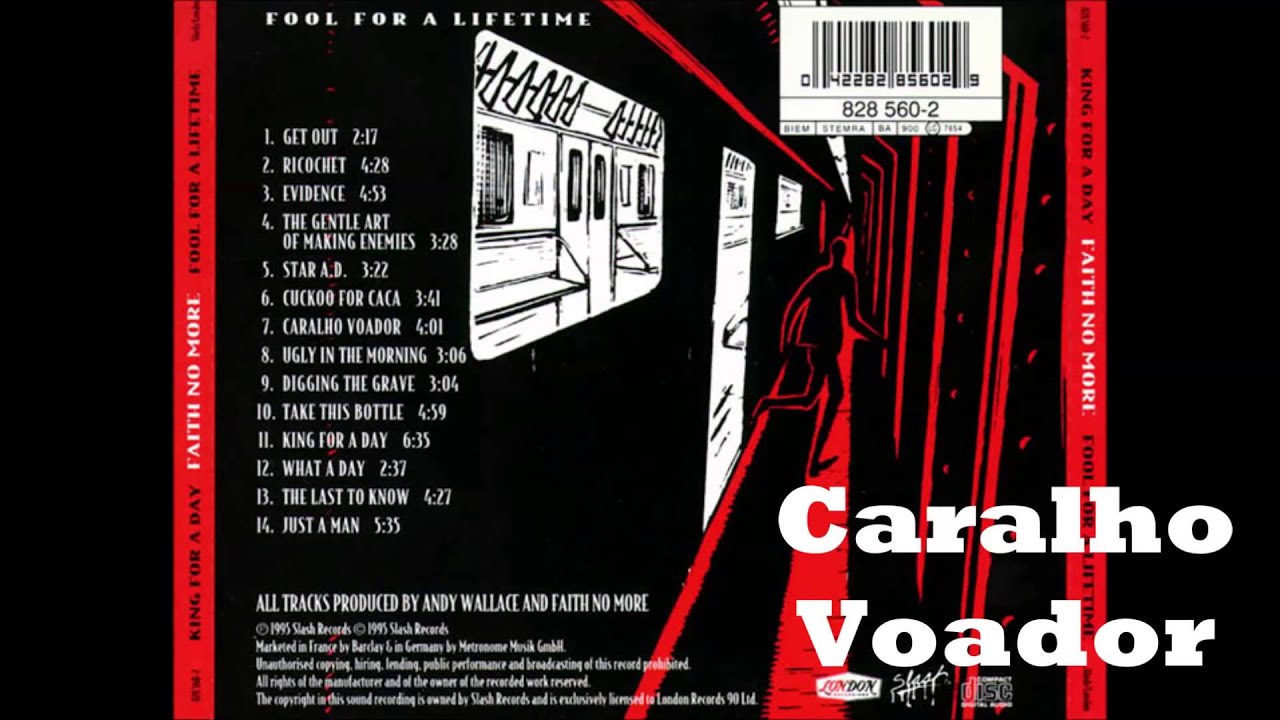"Doing the record was like taking a really satisfying shit."
Mike Patton
What if there’s no more fun to have? It’s a question Patton posits at the outset of King For A Day… Fool For a Lifetime on opening track ‘Get Out’, and it was a question Faith No More fans coming to the album for the first time were genuinely asking themselves in 1995. For a start, talismanic guitarist Jim Martin had left to become a full time pumpkin farmer, the one member of the band the public easily recognised – and maybe even identified with – despite the fact that most people don’t walk around with a Charles Manson beard, Deirdre Barlow glasses and a red flying V hanging from their necks. His look and his solos were Faith No More trademarks – strip them away and people become confused when all they’re left with is a bunch of weirdos from Baghdad by the Bay.
Then there was that title, King For A Day… Fool For A Lifetime, which was not only cumbersome but also redolent of the execrable Thompson Twins, who had a minor hit with a song of the same name (the first part anyway) in 1985. Other changes included a switch from longtime producer Matt Wallace to Andy Wallace (no relation), and the recording location moved from San Francisco to Upstate New York for the first time. The lack of distractions would prove to be a boon, though the resulting focus would possibly be too much for early adopters of the band. Chuck Moseley-era Faith No More fans were never too interested in words like ‘professionalism’ and ‘musicianship’.
In the same way that Nirvana fans love In Utero and everyone else loves Nevermind, discerning Faith No More fans – or perhaps contrary ones – are less about The Real Thing, or even Angel Dust, than they are about the two that bookend these multi-platinum stadium fillers (the two popular records sold more than £7 million copies combined). Perhaps due to their ubiquity at the time – both albums sound like products of their time in the same way that say, Bill Hicks, does. Introduce Yourself on the other hand is far more cohesive and accomplished than memory alone attests: it’s oddly au courant, enchanting, funny, amazing to dance to and very, very cool sounding, mixing up David Bowie, Killing Joke and Talking Heads and giving it an inimitable West Coast slacker vibe.
The album we’re concerned with is a stranger, more eclectic beast, taking in the usual metal, pop and twisted funk, while consciously adding lounge, jazz, bossa nova, big band funk, soul, gospel and country and western into a deathly boiling pot. It’s certainly the most adventurous and envelope-pushing of all the Faith No More records, and while it might have been a disappointment to London Records netting a not-really-to-be-sniffed-at £1.5 million, it’s the most fun to listen to for the wealth of ideas alone. Faith No More were always at their best when they were subversive (and that includes subverting themselves) and so it proves.
One factor that might explain the schizoid nature of the record was the addition of guitarist Trey Spruance from Mike Patton’s other band Mr Bungle, an avant garde metal troupe from Eureka, California who are fine in small doses. When Bungle get it right, like on ‘Air-Conditioned Nightmare’, they’re formidable, though the erratic Zappa-like fucking around becomes wearying rather quickly if you’re not on ritalin. The dynamic certainly shifted, though Spruance denies much artistic control, claiming he entered when most of the material had already been written. His tenure with Faith No More was brief and you suspect it was an indifferent period for him; he left the band before they resumed touring, with Dean Menta – who’d been waiting in the wings as roadie – taking over. If Spruance claimed to be a subordinate, his influence certainly wasn’t inconsequential in the time he was on board, with his writing contributions and guitar parts on ‘Ricochet’ and especially his dry and languorous soul funk overlay on ‘Evidence’ standing up to anything else in the band’s canon.
According to Greg Prato in the Faith No More & Mr Bungle Companion, keyboardist Roddy Bottum was also seriously bummed out, having come out of rehab. Still depressed over the death of his friend Kurt Cobain, most of the tracks were hammered out between BIlly Gould on bass and Mike Bordin on drums in the practice room. Patton might have become the cynosure of the band around the time of Angel Dust, but for this album he was more its sinecure, so distracted was he by outside interests, at least in the early process of laying down material. Incidentally, it seems to be Patton who drove the final – and some might say unfinished – Album Of The Year in 1997, and a cursory look at the writing credits suggests he either he took charge in an unhealthy way with yet another new guitarist drafted in (Jon Hudson), or the other core members of the band losing interest towards the end. The general impression from interviews then that the forthcoming Sol Invictus has been a democratic affair bodes well, or it could be wishful thinking if I’m honest*.
The first track ‘Get Out’ is all Patton though, and as such it’s perhaps the most easily identifiable Faith No More track on the album. Built around a driving snare with a riff that sounds like its trying to punch its way out of a bag, Patton’s vocal is oddly reminiscent of Elvis Costello at his most energetic, at least until he switches to that full-throated screamo voice he’s so incredible at. As such, it works as a perfect mission statement that there is indeed still plenty of fun to still be had. It never quite made it out on its own as a single as it was perhaps a little too weird for catholic public tastes, with the chugging, straightforwardly heavy/catchy ‘Digging The Grave’ and ‘Ricochet’ alighting respectably on the hit parade but hardly setting the charts alight. Best single of all (and faring worst) was ‘Evidence’, a record with a groove so sexy it must have sent rednecks running for the hills.
‘The Gentle Art Of Making Enemies’ switches between a David Sylvian smooth verse and a deranged bridge where Patton spits "happy birthday fucker" and claims to be "the best fuck that you ever had". ‘Star AD’ is a discombobulating big band number, ‘Cuckoo For Caca’ is a punishing death metal track that wouldn’t have been out of place on Angel Dust, while ‘Caralho Voador’ (Portuguese for flying cock) is the most breezy, unhurried track on the album. Other highlights include the country and western melodrama of ‘Take This Bottle’ that’s actually the best song Guns ‘n’ Roses never recorded, and ‘Ugly In The Morning’ deals with the horror of… looking ugly in the morning.
If there was fun to be had there was also sadness too, when they discovered the Bee Gees’ ‘I Started A Joke’ while on tour on a small island somewhere off the Philippines. ‘I Started A Joke’ ended up as the bonus track on the Brazilian version of King For A Day…
"Guam is like a rock in the middle of the ocean," Billy Gould later explained to Prato. "They have like two million snakes per mile – they have so many snakes that they’ve killed all the birds; they have no more birds in all of Guam. So we’re sitting in this bar and they have hardcore videos all over the wall. It was a regular bar, and they had animal porn on the wall! And we’re like, ‘What the hell is this?!’ And in the corner of the room they had this karaoke machine and they were all singing the words ‘I started a joke…’ and there was this bouncing ball so they could follow the words. The lyrics were so pathetic and depressing that we just said ‘We have to do this song!’ It’s the most miserable song I ever heard in my life!’
When Faith No More finally dissolved in 1998, they released a compilation album, Who Cares A Lot?, with a picture of Benny Hill on the cover, and their final single fittingly, and slightly depressingly, was ‘I Started A Joke’. Two of the Gibb brothers might have finally died, but Sol Invictus has got his hat on, he’s rising again, and there might just be some more laughs to be had after all.
*Having listened to Sol Invictus, I can confirm it is at least 300 times better than I was expecting, and to be honest I had high hopes. Hallelujah then!




